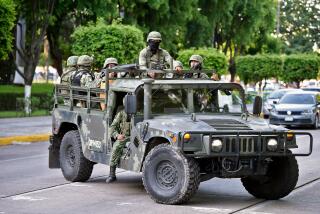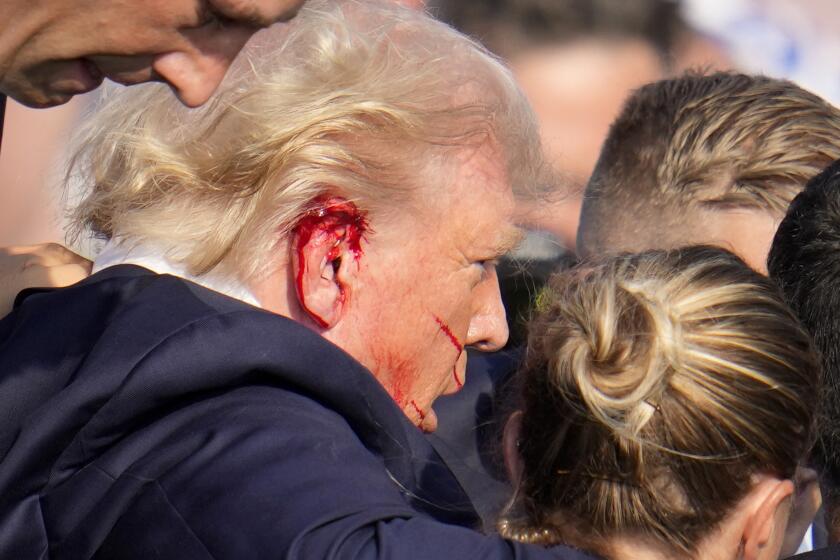Vatican Has ‘Difficulties’ With Jesuit’s Book on Pluralism
The Vatican said Monday that it has obliged a prominent Jesuit theologian to acknowledge “ambiguities and difficulties” that might lead readers of his award-winning book to conclude that sinners can achieve spiritual salvation with no help from the Roman Catholic faith.
The announcement ended a high-profile heresy investigation that underscored the Vatican’s recent assault on the idea that one religion is as good as another.
It was coupled by Pope John Paul II’s call Monday for a special meeting of the College of Cardinals in May to help him map the future of his 1-billion-member church and its relations with non-Catholics.
The suspected heretic, Father Jacques Dupuis, is a 77-year-old Belgian who spent nearly half his life teaching in India. His 1997 book, “Toward a Christian Theology of Religious Pluralism,” has been published in English, French and Italian and is widely acclaimed as a catalyst for better Christian understanding of other religions. The U.S.-based Catholic Press Assn. gave it an award in 1998.
After nearly three years of off-and-on questioning by the pope’s doctrinal watchdog agency, the case against Dupuis ended in a compromise. The Vatican’s Congregation for the Doctrine of the Faith recognized the author’s “attempt to remain within the limits of orthodoxy” and chose not to censure or silence him.
Instead, Dupuis signed a formal notification of the Vatican’s case against his book and agreed to incorporate its criticisms into future editions.
At issue in the probe was the Catholic doctrine, restated in a Vatican document with much fanfare in September, that Catholicism is superior to rival beliefs and that Jesus Christ “is the sole and universal mediator of salvation for all humanity.”
To many non-Catholic leaders around the world, that document seemed to deflate John Paul’s bold efforts to reach out to other Christian denominations and to non-Christians. The pope has since emphasized that such efforts will continue, but he has not backed away from the doctrine. By signing the notification against Dupuis, he reaffirmed it.
“It is contrary to the Catholic faith to consider the different religions of the world as ways of salvation complementary to the [Catholic] Church,” the notification said. It reminded the author that “followers of other religions are oriented to the Church and are all called to become part of her.”
The 2 1/2-page rebuke offered no citations from the book that differed from that teaching. But it asserted that the book “contained notable ambiguities and difficulties on important doctrinal points, which could lead a reader to erroneous or harmful opinions.”
Dupuis, a professor emeritus at the Pontifical Gregorian University in Rome and editor of its academic journal, said he was withholding comment on the notification until today.
Father Gerald O’Collins, a teaching colleague at the university who was Dupuis’ chief advocate during the investigation, insisted that the book does not contradict Vatican doctrine and that the author “doesn’t have to change a sentence.”
“They’re not saying this is wrong, or this has to be added, or you have to write another chapter,” O’Collins said. “I presume he’ll include the notification as an appendix.”
In a 1998 review written for the Tablet, a London-based Catholic weekly, O’Collins boiled down the theologian’s central point: “As revealer and redeemer, Jesus is one and universal, yet in practice the visible paths to salvation have remained many.” In an interview Monday, he described the difference between that view and the Vatican’s as one of “subtle disagreement over emphasis.”
Father Peter-Hans Kolvenbach, the Jesuit superior general, said he hopes that the end of the inquiry will free Dupuis to “continue his pioneer research in the field of inter-religious dialogue, which John Paul II encourages as a challenge for evangelization in the third millennium.”
That topic is part of a broad agenda the pope will put before cardinals at the May 21-24 gathering. The blueprint will be his latest apostolic letter, “At the Beginning of the New Millennium,” which listed challenges as diverse as fighting abortion and adapting Catholic traditions to the needs of different cultures.
The announcement of the meeting came as a surprise. John Paul had just wound up three days of ceremonies that elevated 44 prelates to cardinal rank here last week.
Some cardinals are expected to push at the meeting for greater collegiality--a code word for democracy--to help the church confront internal problems.
Cardinal Roger M. Mahony, archbishop of Los Angeles, said he hopes that the gathering will help boost the role of national bishops conferences and local churches.
In a weekend interview, Cardinal Oscar Andres Rodriguez Maradiaga of Honduras said the church’s top priority in Latin America should be fighting poverty, corruption and social injustice.
“Many of the problems of the First World are not ours; we have to deal in the trenches,” he said, adding that he doesn’t feel the weight of excessive Vatican oversight. “The ocean is very big. And so we have a great feeling of freedom.”
More to Read
Sign up for Essential California
The most important California stories and recommendations in your inbox every morning.
You may occasionally receive promotional content from the Los Angeles Times.





